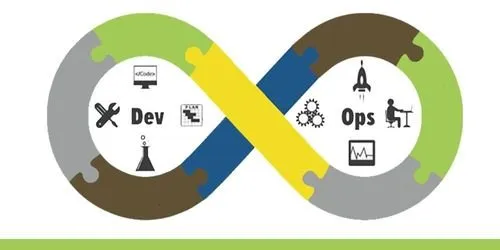What is DevOps? DevOps is a set of tools and practices that bring together software development and operations, bridging the gap between the two. This approach is witnessing a rise in its demand due to provision of high quality software delivery on a continual basis. The aim behind using this approach is to make sure that flaws are reduced to the minimum and productivity is increased to the maximum.
For this purpose, although there are a number of DevOps tools that are used in the market, few of them are exceptionally good namely, AWS, Jenkins, Terraform, and Kubernetes. These tools automate the process of software development by focusing primarily on collaboration and communication between the professionals with different roles and working in different teams.
This blog will illustrate the best tools with their respective categories to use for DevOps processes:
1. Containers- Docker:
Containers are software development platforms that enable developers to create, test, and deploy products in resource-independent conditions. Each container contains the whole runtime environment, which includes the software, its modules, source code, settings, and all of its resources. Platforms for containers provide orchestration, automation, security, governance, and other functionalities. For fast application development and deployment, DevOps mainly relies on containerization, with Docker being the most extensively used container technology. The Docker engine was created to make developing, deploying, and managing containerized applications on single nodes easier. Docker is free and open-source software that works with cloud services and runs on Windows and Linux.
2. Infrastructure as Code (IaC)-Terraform:
Hashicorp developed Terraform as an open source tool to automate the provisioning of infrastructure resources. It supports all public and private cloud infrastructure provisioning like Networks, Servers, managed services, and Firewall. Infrastructure as a coding philosophy is used to create, manage, update, and destroy infrastructure resources such as virtual machines, containers, networking, and others. Terraform uses a notion called state files to keep track of the state of your infrastructure. HCL (Hashicorp configuration language) is Terraform's own domain-specific language.
3. Container Orchestration System - Kubernetes:
Kubernetes is a prominent container orchestration platform and an open-source DevOps solution for automating the deployment and administration of containerized applications. To achieve effectiveness and quality in production, developers use Kubernetes to automate tasks like container initialization, scalability, communication, security, and more. Kubernotes is unique because it has the ability to heal itself. It makes modifications to your application or its setup while also monitoring its health. Rollouts and rollbacks get automated. It also provides a set of Pods with their own IP addresses and a single DNS name for Service Delivery and load balancing.
4. Continuous Integration/Delivery (CI/CD)- Jenkins:
Jenkins is a Java-based open-source automation platform with plugins designed for Continuous Integration. If you want to integrate a certain tool, you need to install the tool's plugins. It also enables you to deliver your software on a continuous basis by interacting with a variety of tests and deployment technologies. Jenkins, which was created by Kohsuke for Continuous Integration (CI), is now the most extensively used Continuous Delivery (CD) solution. It has thousand-plus plugins that allow it to integrate with almost any tool. Jenkins continues to gain traction as the most widely used continuous integration and delivery tool in the world.
Conclusion:
In order to actualize the benefits of DevOps, choosing the best tools is imperative. Right tools help realize the advantages by breaking down communication silos and improving productivity. It must be noted that it takes time to implement the culture shift and not just a night.










